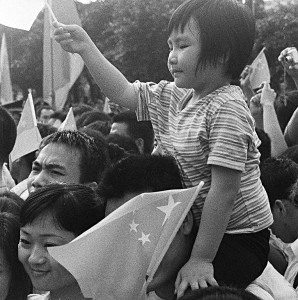Amidst talk of an aging society and a depleting demographic dividend, appeals for a reconsideration of China’s One-Child Policy were voiced during the annual meetings of the National People’s Congress and the Chinese People’s Political Consultative Conference held Mar. 3 to 14.
Zhang Yin, China’s wealthiest woman and member of the Chinese People’s Political Consultative Conference, called for a “gradual release” from the 30 year-old policy, with a three to five year trial period allowing some the right to have a second child before the nation as a whole.
In an interview with Southern Weekend [1] Zhang said she was one among many who voiced concern over China’s low birth rate and the consequences of an aging society.

(photo/Don Weinland)
In an open letter [2] issued by the Communist Party’s central committee in September of 1980, the One-Child Policy was suggested in order to relieve the demographic tensions of runaway birth rates. The letter states that after 30 years of state controlled family planning, “different demographic policies can be adopted.”
As the policy completes its 30 year course, the future of family planning has become a topic for debate. Despite a long tradition of large families in China, online opinion concerning a possible “Two-Child Policy” is mixed.
Blogger You Xin [3] sees the One-Child Policy as inseparable from China’s long-term growth and conservation of resources.
计划生育是我国的基本国策,人口数量控制在今后很长一段时间内还是要有力执行的。只有将人口总量控制在一个适度范围,面临日益匮乏的资源短缺,我国人均资源量才不会及其匮乏,人民生活水平才会有质的提高。
Family planning is a fundamental policy in my country. Population control for a long period of time in the future must be carried out with force. In the face of daily increasing shortages of resources, only population control on a suitable scale will prevent extreme per capita resource shortages. Only then can the people’s quality of living be raised.
You Xin says China’s demographic dividend, the world’s largest group of labor-aged workers largely responsible for powering the country’s manufacturing engine, has not helped develop a white-collared job market suitable for university graduates.
为什么大学生就业难?并不要找不到工作,而是找不到合适的工作。大学生作为知识分子,当然不愿融入制造业当中了。对于”人口红利“时代的拐点,劳动力下降,我们可以采取其他措施,而不是放开二胎政策 … 随着以后经济发展,我国也可仿效发达国家,将制造业大批转入其他更贫穷的国家。
Why can’t university students find a job? It’s certainly not because we can’t find work, but because we can’t find suitable work. Students, as intellectuals, of course aren’t willing to go into manufacturing … As the economy develops further, [China] can follow the example of developed countries and transfer manufacturing on a large scale to other poorer countries.
Blogger ‘Grassroots Public Servant [4]’ disagrees, saying growth in the manufacturing work force is essential to China’s future and may influence the passing of a “Two-Child Policy” sooner than later.
如果中国经济能够较快复苏,则民工荒会加剧,且远比前几年厉害,有可能促使全面放开二胎政策的提前出台。未来中国经济发展的一大制约因素,必然是劳动力,特别是低端劳动力的供给不足。
If China’s economy recovers relatively quickly, dramatically increasing the laborer shortage even more than the last few years, this may expedite the passing of the Two-Child Policy nationally. A major limitation to China’s future growth will certainly be labor power, especially shortages in the supply of low-level labor.
Blogger Wan Yu [5], who calls herself a basic level family planning officer, says the One-Child Policy was adopted to meet the economic challenges caused by the Cultural Revolution, which ended in 1976 and resulted in widespread unemployment. She says the policy was directed toward one generation of citizens and should be reviewed.
A deterioration of tradition family relationships is one of many problems Wan Yu cites with the continuation of the One-Child Policy.
…曾听见音像店播放一种儿歌,内容是“爸爸的哥哥是伯伯,妈妈的妹妹是姨妈……”,初听颇觉匪夷所思,细想不胜感慨,几代独生子女状态如果延缓下去,这些家庭伦常关系将成为历史遗迹,孩子们只有在儿歌里才能听明白,他们的社会关系会与现在出现极大差别。
I once heard a music store playing a children’s song that went like this: “My dad’s brother is my uncle. My mom’s sister is my aunt…” When I first heard it I thought it was unbelievable and couldn’t help but sigh. If generations of single children continue, the traditional family relationships of these families will become a historical artifact. Children will know [these names] from children’s songs only. Their social relationships will be extremely different from ours.
Blogger Shui Lian [6] disagrees with the idea that a “Two-Child Policy” will permanently solve China’s demographic problems and argues that higher birth rates will continue the cycle of China’s once-endemic overpopulation problems.
…如果放开二胎政策的构想成为现实的话,为了养老就可以多生子女,那么,当这些子女老去的时候,他们又要依靠谁来养老呢?这不仅会人为增加社会养老的成本,而且势必加大每一个家庭的养老负担,是一种不折不扣的逻辑悖论。
If two-child policy thinking becomes a reality, and we can have more children in order to take care of the elderly, then who will they rely on to take care of them when they grow old? This will not only artificially increase the costs of care for the elderly but will increase every household’s burden for caring for them. It is purely a contradiction in logic.
Results from China’s sixth national census point to the possibility of an easing in family planning policy. Southern Weekend [1] reports that conditions that were once described as “population pressures” are now being called “advantages in human resources”. What was once called “population control” has now been dubbed “population development”, the article says.